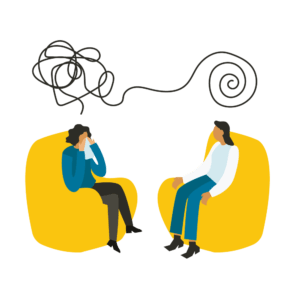Addiction can be a crippling disease that affects both the mind and the body. If you are struggling with addiction, know that you are not alone. Millions of people around the world are fighting similar battles every day. Thankfully, there is help available. Addiction therapy can provide you with the tools you need to overcome your addiction and start living again. In this blog post, we will discuss what addiction therapy is and how it can help you achieve sobriety.
Contents
- 1 Defining Addiction
- 2 Therapy For Addiction
- 2.1 Cognitive-Behavioral Therapy (CBT)
- 2.2 Dialectical Behavior Therapy (DBT)
- 2.3 Mindfulness-Based Relapse Prevention (MBRP)
- 2.4 Rational Emotive Behavior Therapy (REBT)
- 2.5 Cognitive Processing Therapy (CPT)
- 2.6 Acceptance and Commitment Therapy (ACT)
- 2.7 Person-Centered Therapy (PCT)
- 2.8 Eye Movement Desensitization and Reprocessing (EMDR)
- 2.9 Motivational Interviewing (MI)
- 2.10 Contingency Management (CM)
- 2.11 12-Step Facilitation Therapy (12-SFT)
- 2.12 Group Therapy
- 2.13 Family Therapy
- 3 Finding The Right Therapist
- 4 Things To Consider
- 5 Conclusion
Defining Addiction
Addiction is defined as a chronic, relapsing disorder characterized by compulsive drug-seeking and use despite harmful consequences. It is considered a brain disease because it changes the way the brain functions. Over time, the changes in the brain caused by addiction can result in drastic changes in a person’s mental, physical, behavioral, emotional, as well as cognitive abilities.
It is important to note that addiction is not simply a matter of willpower. Many people struggling with addiction want to quit but are unable to do so on their own. This is because addiction is a disease that alters the brain in such a way that it becomes extremely difficult to break the cycle of drug use and compulsive behavior without professional help.
Types
When talking about addiction, the first thought in everyone’s mind goes to illegal drugs. However, addiction can encompass much more than that. People can be addicted to a lot of substances or activities, such as:

- Alcohol
- Cigarettes
- Prescription medications, such as painkillers, sedatives, etc.
- Gambling or betting
- Food
- Phone, internet, or social media usage
- Gaming
- Exercise
- Shopping
- Sex
These are just a few examples of the types of addiction that people can suffer from. As you can see, addiction does not discriminate. It can affect anyone, regardless of age, gender, race, socioeconomic status, or background.
Signs
The signs and symptoms of addiction can vary depending on the type of addiction someone is struggling with. However, there are some general signs and symptoms that are common among all types of addiction, such as:
- Withdrawal symptoms when the person attempts to stop using the substance or engaging in the addictive behavior
- Tolerance, which is when the person needs to use more and more of the substance or engage in the behavior more frequently in order to achieve the desired effect
- Loss of control, which is when the person is unable to limit their use of the substance or participation in the behavior
- Neglecting other important areas of life, such as work, school, family, etc.
If you are struggling with any of these signs or symptoms, it is important to seek help as soon as possible.
Consequences

Addiction can have several negative consequences, both short-term and long-term. These consequences can include:
- Physical health problems, such as liver damage, heart disease, lung cancer, etc.
- Mental health problems, such as anxiety, depression, paranoia, etc.
- Cognitive problems, such as memory loss, impaired judgment, etc.
- Social withdrawal and isolation
- Emotional instability such as mood swings, irritability, etc.
- Problems with work or school
- Relationship difficulties
- Financial problems
- Legal problems
These are just some of the ways that addiction can negatively impact a person’s life. As you can see, addiction is a serious disease that should not be taken lightly. If you think you may be struggling with addiction, it is important to seek help from a professional as soon as possible.
Therapy For Addiction

Luckily, the mental health field has come a long way, and now, there are a number of effective treatments for addiction. One of the most common and effective treatments is therapy.
Addiction therapy is the process of working with a mental health professional to identify the underlying causes of addiction and develop coping mechanisms to deal with those causes. It also works to make the client resilient to triggers and temptations.
Therapy can take many different forms, but the goal is always the same: to help the person struggling with addiction overcome their disease and start living a healthy, happy, and fulfilling life.
There are a number of different types of addiction therapy, such as:
Cognitive-Behavioral Therapy (CBT)

CBT is one of the most common and effective types of addiction therapy. It works by helping the client identify negative thought patterns and behaviors that contribute to their addiction and replacing them with more positive ones.
Cognitive-behavioral therapy, as the name suggests, focuses on both thoughts and the behaviors. It helps the client to identify any negative or distorted thinking patterns that are contributing to their addiction and then works to change those thought patterns. CBT helps the client develop skills to deal with triggers and cravings.
CBT has been shown to be an effective treatment for a number of different types of addiction, such as alcohol addiction, drug addiction, gambling addiction, food addiction, etc.
Dialectical Behavior Therapy (DBT)
DBT is another type of cognitive-behavioral therapy that is specifically designed for treating addictions. It works by teaching the client skills like mindfulness, emotional regulation, and distress tolerance.
DBT is another type of cognitive-behavioral therapy that was specifically designed to treat people with borderline personality disorder. However, it has also been found to be an effective treatment for a number of different types of addiction, such as alcohol addiction, drug addiction, gambling addiction, food addiction, etc.
DBT works by teaching the client skills like mindfulness, emotional regulation, and distress tolerance. These skills help the client to deal with triggers and cravings in a more effective way.
Mindfulness-Based Relapse Prevention (MBRP)
MBRP is a type of cognitive-behavioral therapy that focuses on helping the client become more aware of their thoughts and feelings to prevent relapse. It also teaches the client coping mechanisms to deal with triggers and cravings.
MBRP is an evidence-based treatment that has been shown to be effective in treating a number of different types of addiction. It works by teaching the client skills like mindfulness, emotional regulation, and distress tolerance. These skills help the client to deal with triggers and cravings in a more effective way. It is a great option for those who are looking for an alternative to traditional cognitive-behavioral therapy.
Rational Emotive Behavior Therapy (REBT)
REBT, also known as rational emotive behavior therapy, is another type of cognitive-behavioral therapy. It works by helping the client identify and change any irrational beliefs that are contributing to their addiction.
The process of REBT is similar to CBT, but with a focus on changing irrational beliefs. This type of therapy has been shown to be an effective treatment for a number of different types of addictions. Additionally, it also works well for those who are struggling with co-occurring mental health disorders, such as depression or anxiety.
Cognitive Processing Therapy (CPT)
CPT, also known as cognitive processing therapy, is a type of therapy that helps clients process and make sense of their trauma. It does this by helping the client to identify and change any negative thoughts or beliefs they have about themselves or the world around them.
This type of therapy can be beneficial for those who are struggling with addiction and co-occurring mental health disorders, such as PTSD. CPT has been shown to be an effective treatment for a number of different types of addictions.
Acceptance and Commitment Therapy (ACT)

ACT, also known as acceptance and commitment therapy, is another type of cognitive-behavioral therapy. It works by helping the client to accept their thoughts and feelings without judgment. Additionally, it helps the client to develop a committed relationship with their values.
ACT works in ways that allows the client to become more aware of their thoughts and feelings without judgement. It also helps the client develop a committed relationship with their values which allows for sustainable change. This type of therapy has been shown to be an effective treatment for a number of different types of addiction.
Person-Centered Therapy (PCT)
PCT, also known as person-centered therapy, is a type of therapy that focuses on the client’s strengths and capabilities. It works by helping the client to develop a positive view of themselves and their ability to change.
This approach can be beneficial for those who are struggling with addiction, as it can help them to develop a positive view of themselves and their ability to change. Additionally, PCT has also been shown to be an effective treatment for a number of different types of addictions.
PCT focuses on the client’s strengths and capabilities. It works by helping the client to develop a positive view of themselves and their ability to change. This approach can be beneficial for those who are struggling with addiction, as it can help them to develop a positive view of themselves and their ability to change.
Eye Movement Desensitization and Reprocessing (EMDR)
EMDR, also known as eye movement desensitization and reprocessing, is a type of therapy that uses bilateral stimulation to help the client process and heal from trauma. It has been found to be an effective treatment for a number of different types of addictions, as well as co-occurring mental health disorders such as posttraumatic stress disorder (PTSD).
EMDR works by helping the client process and heals from trauma. It uses bilateral stimulation to help the client access and process memories in a more effective way. This type of therapy can be beneficial for those who are struggling with addiction and co-occurring mental health disorders, such as PTSD.
Motivational Interviewing (MI)
MI is a type of therapy that helps the client overcome any ambivalence they may have about changing their behavior. It does this by helping the client explore their values and goals and develop a plan to change their behavior.
This approach works well for those who are struggling with addiction, as it can help them to overcome any ambivalence they may have about changing their behavior. Additionally, MI has also been shown to be an effective treatment for a number of different types of addictions.
Contingency Management (CM)
CM, also known as contingency management, is a type of therapy that uses rewards to help client change their behavior. It has been found to be an effective treatment for a number of different types of addictions.
This approach works by providing the client with rewards for abstaining from drug use. Additionally, it can also help the client to develop other healthy behaviors, such as exercise and good nutrition. It also encompasses many different techniques, such as contingency contracting and voucher-based reinforcement. All of these techniques are effective in the treatment of addiction.
12-Step Facilitation Therapy (12-SFT)

12-SFT, also known as 12-step facilitation therapy, is a type of therapy that helps the client to engage in and benefit from participation in a 12-step program. It has been found to be an effective treatment for a number of different types of addictions.
This approach works by helping the client to engage in and benefit from participation in a 12-step program. Additionally, it can also help the client to develop other healthy behaviors, such as exercise and good nutrition.
The 12 steps are as follows:
- First: We admit we were powerless over our addiction and that our lives had become unmanageable.
- Second: We came to believe that a power greater than ourselves could restore us to sanity.
- Third: We made a decision to turn our will and our lives over to the care of God as we understood Him.
- Fourth step: We made a searching and fearless moral inventory of ourselves.
- Fifth: We admitted to God, to ourselves, and to another human being the exact nature of our wrongs.
- Sixth: We were entirely ready to have God remove all these defects of character.
- Seventh: Humbly asked Him to remove our shortcomings.
- Eighth: Made a list of all persons we had harmed and became willing to make amends to them all.
- Ninth: Made direct amends to such people wherever possible, except when to do so would injure them or others.
- Tenth: Continued to take personal inventory and when we were wrong promptly admitted it.
- Eleventh: Sought through prayer and meditation to improve our conscious contact with God as we understood Him, praying only for knowledge of His will for us and the power to carry that out.
- Twelfth: Having had a spiritual awakening as the result of these steps, we tried to carry this message to addicts, and to practice these principles in all our affairs.
All of these steps can be beneficial for those who are struggling with addiction. 12-SFT can help the client to engage in and benefit from participation in a 12-step program, which can lead to lasting sobriety.
Group Therapy

Group therapy is a type of therapy that uses the power of group support to help the client overcome their addiction. It is an effective treatment for a number of different types of addictions.
This approach works by providing the client with a support system for other people who are struggling with addiction. This can help them to feel less alone and can provide them with the motivation to change their behavior.
It works by bringing together a group of people who are struggling with addiction. This can help them to feel less alone and can provide them with the motivation to change their behavior. Additionally, group therapy can also help the client to develop new coping skills and learn more about their addiction.
Family Therapy
Family therapy is a type of therapy that uses the power of family support to help the client overcome their addiction. It is an effective treatment for a number of different types of addictions.
This approach works by providing the client with a support system from their family and friends. This can help them to feel less alone and can provide them with the motivation to change their behavior. Additionally, family therapy also aims to equip the family with the tools they need to support their loved ones through their addiction.
It works by bringing together a group of people who are struggling with addiction. This can help them to feel less alone and can provide them with the motivation to change their behavior. Additionally, family therapy can also help the client to develop new coping skills and learn more about their condition.
These are the various kinds of addiction therapies available that can help you in your journey to recovery. Each type of therapy works in a slightly different way, but they all share the common goal of helping the client overcome their addiction and start living again. It is important to remember that addiction is a disease, and it requires treatment. If you or someone you know is struggling with addiction, please seek help from a professional. There are many resources available to help you on your road to recovery.
Finding The Right Therapist

Now that we know more about addiction therapy, its types and benefits, and also how they work, the next thing is finding the right therapist. But how do we do that?
The first step is to assess your personal needs. This means evaluating yourself for your requirement of therapy. You should consider things like what kind of addiction you have, how long you have been struggling with it as well as the severity of your addiction. Additionally, you should also think about logistics such as time and money.
Once you have done that, the next step is to find a therapist who specializes in treating addiction. This is important because they will be able to provide you with the best possible care and treatment.
You can look for therapists in your area by searching online or by asking for recommendations from friends or family members. Once you have found a few potential therapists, the next step is to schedule a brief consultation and have an introductory session with them.
During your first meeting, be sure to ask questions about their professional approach. Here are some questions you can ask yourself or a potential therapist to help you figure out if they’re the right fit for you:
- Do they have experience treating addiction?
- Do they have a specialty in treating addiction?
- What is their approach to treatment?
- Do they offer individual, group, or family therapy?
- What are their qualifications?
- Will they be able to provide additional help (such as medication or rehabilitation)?
- What is their policy on confidentiality? Take your time in finding the right therapist
- Are they licensed and accredited?
- What is their fee structure?
Asking these questions will help you to find a therapist who is qualified and experienced in treating addiction. And that’s important because addiction is a complex disease, and it requires specialized treatment.
Lastly, it is crucial to ensure that you feel comfortable with your therapist. This is because the therapy process can be emotionally challenging, and you need to feel safe and supported in order to heal.
If you don’t feel comfortable with your therapist, it’s okay to look for someone else. The most important thing is that you find a therapist who you can trust and who makes you feel safe.
Things To Consider
Treatment for addiction can vary depending on the person and the severity of their addiction. However, there are some general steps that most people will go through in order to overcome their addiction.
- The first step is recognizing that we have a problem. This can be difficult for some people, as admitting that we have an issue can be seen as admitting defeat. However, this is an important step in overcoming our addiction and taking back control of our lives.
- The next step is seeking help from a professional or entering into a treatment program. This is a vital step, as addiction is a disease and it requires professional help to overcome.
- Once we have sought help, we will then begin the process of recovery. This can be a long and difficult journey, but it is one that is worth taking. Recovery is not easy, but it is possible.
- There may also be times when you relapse. This is normal, and it does not mean that you have failed. It is important to remember that relapse is a part of the process and it does not mean that you are doomed to fail.
If you or someone you know is struggling with addiction, please seek help. There are many resources available to help you on your road to recovery. Remember, addiction is a disease and it requires treatment. With the right help, you can overcome your addiction and start living again. Seek help today and start living the life you deserve.
Conclusion
Addiction is a serious disorder that requires specialized treatment. Fortunately, there are various types of addiction therapies available, and the best one for you will depend on your personal needs. It is important to find a therapist who has experience in treating addiction and who you feel comfortable with.
If you are looking for affordable Online Counseling MantraCare can help: Book a trial therapy session


